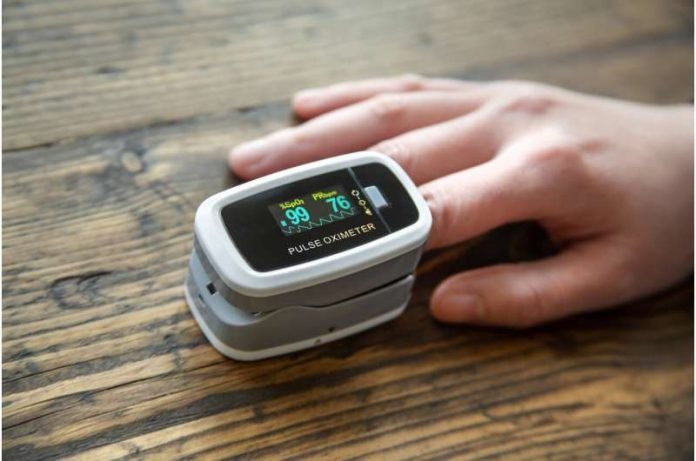
A new study from Imperial College London found measuring blood oxygen levels at home is a safe way for people with COVID-19 to spot signs that their health could be deteriorating, and they may need emergency and hospital care
The study is published in Lancet Digital Health and was conducted by Dr. Ahmed Alboksmaty et al.
Pulse oximeters are widely available, low-cost devices that shine light through a person’s finger to assess their blood oxygen saturation.
Evidence has shown that a fall in blood oxygen levels is a critical indicator that a COVID-19 patient’s health is deteriorating and they may need closer monitoring and urgent treatment.
In the study, the team examined 13 studies involving almost 3,000 participants across five countries, most of which were carried out during the first pandemic wave.
The scientists found that with medical guidance, home pulse oximetry can act as a safety net, reducing unnecessary emergency and hospital admissions for patients who can safely stay at home, while spotting early signs of deterioration and escalating care in those who need it.
This would help to save stretched resources, and reduce the further potential spread of the virus from contact in health settings.
However, the researchers note a lack of research on darker-skinned patients, for whom oximetry may be less accurate than in white people.
Based on their findings, the researchers put forward a set of key recommendations that can help standardize the use of oximetry in-home COVID-19 monitoring.
Importantly, the study recommends the use of a defined cutoff point in blood oxygen levels (92%), which will enable healthcare professionals to determine when a patient needs to go to the hospital for treatment, or whether they can rule out the need for further care at the time.
Several research studies have developed several new COVID-19 tests.
Recent studies have found the key to curing COVID-19, and the new antibody treatment for COVID-19, which are relevant to the current study.
In a study from the University of Aberdeen, researchers found a new test using AI-assisted technology is almost 100% accurate in detecting COVID antibodies.
The Universal EpitoGen SARS-Cov-2-test passed the quality assurance assessments by the National Institute for Biological Standards and Control (NIBSC) with a reported accuracy that would outperform existing COVID tests.
The new test detected antibody responses to infection by the SARS-CoV-2 virus from patient samples with more than 99.5% accuracy and 98.5% specificity.
Unlike the ‘traditional,” currently used tests, which can become less accurate as new variants emerge, the innovative EpitoGen technology is just as effective in detecting an antibody response to new variants without losing accuracy.
Therefore, the new tests can be used to estimate the prevalence of circulating variant strains in the community, including the omicron variant.
The Universal EpitoGen test is one of a suite of tests currently in development.
These include tests that can also assess the effectiveness of vaccines against new mutations and allow the incorporation of new mutations into existing tests in a matter of days—something that is not possible using the current technology.
These tests can be adapted quickly and efficiently to incorporate new mutations—an important development, as researchers are right now realizing the importance of detecting and monitoring new COVID variants.
If you care about Covid, please read studies about the cause of persistent breathlessness after COVID-19, and findings of a new way to prevent many COVID-19 variants.
For more information about Covid, please see recent studies about pain and fever drugs that may increase risk of COVID-19 infection, and results showing scientists find new treatment option for COVID-19.
Copyright © 2022 Knowridge Science Report. All rights reserved.



